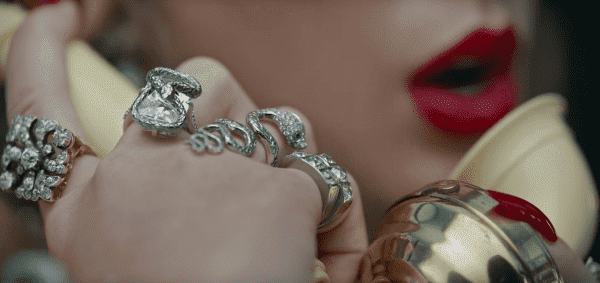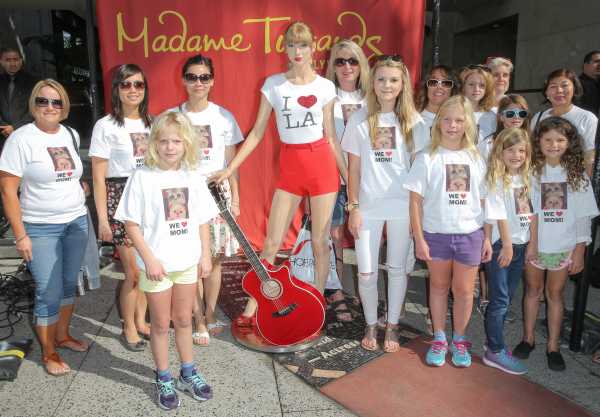

Twenty-two-year-old financial analyst Zainub Amir moved to New York City from Albany last June, around the time that her Taylor Swift news account @SimplySFans celebrated its seventh birthday on Twitter.
The account has 124,000 followers as of this writing, but when Amir started it at the end of eighth grade, there was almost no demand for it. She was alone on Twitter as a Swiftie, she says, with “maybe 30 other fans.” It’s that early adoption of the platform that she credits with her success, and with her permanent place at the top of the Swift fan account hierarchy — it’s too late for anyone else to get this big.
Now Amir has a full-time job and responsibilities to her employer. Also: responsibilities to the 124,000 people who depend on her for news, as well as the management and tour sponsors and brand partners for the biggest pop star in the world, which regularly ask her for help promoting awards shows, limited-edition Keds, and Swift’s every move.
“It’s hard,” Amir tells me, sitting on a corner sofa in her Midtown office building, after most of the lights have gone down but the granola bar wrappers and Lipton tea bags have yet to be scooped from the floor. “The thing is it’s, like, the same thing as texting someone while you’re at work; you just have to be really fast. The whole point of an update account is getting the news first.”
“Everything comes down to sometimes the second or minute you post”
To help, Amir has push notifications set up from fan accounts on Tumblr and Twitter, for Swift’s friends and management and publicity team, and, obviously, for Swift herself, who has made a tentative return to social media in recent months after conspicuously vanishing and deleting thousands of posts last August.
“As soon as she posts, I make sure I put it on Twitter. You just have to be quick about it. After a while, it becomes second nature,” Amir says. She does not use Google Alerts, which are too slow. “Everything comes down to sometimes the second or minute you post.”’
That’s because Amir isn’t alone on Twitter talking about Taylor Swift anymore. There are dozens of update accounts, plenty of fans who are willing to take on the job of fandom as a second full-time position. And Swift is far from the only celebrity who draws this kind of cottage media industry around her.
Last summer, I spoke to 19-year-old Yucatán resident Armin Lizama, who runs one of the biggest Lorde fan accounts on Twitter and regularly helps professional music journalism outlets fact-check fan rumors and news items.
Last spring, Harry Styles fans organized to teach each other how to download VPNs and fake US streams of his first solo single “Sign of the Times,” hoping to game the Billboard charts. One account, @StylesPromoTeam, put out a public application to join them, which was longer than a traditional job application and required applicants to state whether they’d be able to dedicate up to 20 hours per week to the cause. This is just how modern fandom operates.
Most of these fans are not doing it to be compensated, but there is compensation to be found nonetheless — like any account with substantial followings, they can charge for sponsored posts and retweets; like any influencer a brand wants to woo, they can expect gifts and trips and special treatment; like any ambitious young person situated in an economy that celebrates optimizing every moment of your life, they can try to use hundreds of hours of self-managed, largely unpaid “fun” labor as a line item on a résumé.
“I don’t really care about how much money I make with it,” Amir says.
Nevertheless, she’ll readily call her account a business.
And as with any business, there are challenges. One is copyright: “Any time a video goes over 30 seconds and it has music or media, anything from Taylor or any of her sponsors, it usually gets picked up by copyright,” Amir explains. “Same thing with photos that photographers are taking, even if it’s Taylor’s own photographers with Getty Images.” They’ll get flagged and removed, and it only takes six or seven violations to get an account suspended, which is a challenge for accounts updating three or four times a day while an artist is on tour, or dozens of times a night when they’re performing and talking and raking in trophies at an awards show.
“Screen record has become my friend. Mainly when it’s YouTube or DirecTV Now, but I have to be careful, which is why I’ve resorted more to retweeting from the source,” she says. She tries not to push it, usually taking clips of around 10 seconds and asking permission whenever she can.
“You want to grow your reach as much as you can, but is it worth getting that copyright notice at the same time?”
All this is why Amir, like many of the other proprietors of major news accounts, has a separate account just for media, which she’ll retweet into her main account’s feed, giving up maximum engagement on her main page in favor of preserving it.
She’s had to learn how to streamline the process, trying to provide a good product without running herself off the road. “There are all these paparazzi pages you can go on and get the image itself, and then you have to delete the watermark,” she explains. “But it’s not worth [the effort] really, because someone’s just going to post it two seconds faster than you.” She’ll ask permission to repost GIFs and videos from fans at tour shows, but only if she’s sure they’re sharing something Swift hasn’t done before. She’ll engage in trending topics only if she has something to add, an image and a great quote, or a video clip short enough to not get pulled. “Otherwise, I’m better off retweeting from the actual source, even though I’m going to lose engagement.”
She had to figure all this out on her own, since other pages are competitors, jockeying for the same audience and the same engagement.
Swift is counting on her, for real. In 2012, before there were very many other major fan accounts, and before Swift’s team really used or understood Twitter, they asked Amir to be the official promotional account of the Red tour.
When Swift joined her favorite social media platform, Tumblr, in 2014, the account was run by her management and only followed five accounts — all update accounts, and one of them Amir’s. “I posted something about the fall, apple picking or something, and I had no idea anybody was reading it,” Amir recalls. “Taylor reblogged it and it was her first reblog of Tumblr, and she ended up adding this whole paragraph about how she loves the fall. So every fall, late August, September, I get so many notifications because people start reblogging that again and again and again. It’s a ritual.”
Being early to two platforms guaranteed that both Swift and her team would be aware of Amir, which means they regularly come back to her — to include her in special fan activities and to do promotion work. (She’s spent time with Swift in person three times in the past six years.)
“For me, it’s community first; I don’t really think about the money.”
Amir says Swift’s management has a list of popular and reliable update accounts that it gives out to her sponsors and brands regularly dole out exclusive content or giveaway items to her and her update account competitors. Dick Clark Productions, for one, will fly fan account operators to awards shows to post updates live, as well as provide them with a stipend to support a vacation day in Los Angeles afterward.
“Either I get compensated through money or through free items,” Amir says. “Or it’s things like free tickets or perks or just being on the inside or being able to go to a release party. Sometimes it’s not directly money-related, but when it is, it’s per post or how many engagements it gets. That’s why stats or using Twitter analytics is so important — so you can say what your worth is. I’ve had it be $300 for retweeting someone before, because it’s a lot of followers and it’s huge engagement. I think the lowest I’ve done is $50.”
“It’s like another job, basically,” she says. But “it isn’t as stable as people think it is with a fan account like this. For me, it’s community first; I don’t really think about the money.”

It’s not all profit. “I bought the [last] album five times without really meaning to,” Amir says when I ask about how much fans typically spend to put their affection into practice.
Swift combated the ongoing industry-wide decline of album sales by selling two versions of a limited-edition magazine to go with Reputation last fall, each going for $20 exclusively at Target and each coming with another copy of the album. Buying extra copies of her album also helped fans improve their place in line in Ticketmaster’s controversial Verified Fan program, which sorted fans into a queue to buy presale tickets to her stadium tour.
“Every time she lets you into her life, it’s a new marketing scheme, because it’s a new part of her life that you don’t know”
“You want the magazine because you want to see into Taylor’s life; she had to have two different volumes for some reason,” Amir says. “You want the album for the code to put in your Verified Fan thing; that’s your first incentive. And your second is that you want to read these poems that Taylor never released to the world, or pictures that have never before been seen during her two-year [social media] blackout.” The Reputation merch was “trendier” and more expensive than previous Taylor merch, but “as a fan, you tell yourself that you’re just going to compromise and buy it, and you do it without thinking.”
She says she doesn’t want to criticize anyone, but she noticed that Verified Fan tickets were more expensive than regular sale tickets, and says she paid $160 (plus TicketMaster fees) for a decent seat, electing not to spend the nearly $800 it would cost to be in what Swift called “the Snake Pit” at the front of the stage.
“Every time she lets you into her life, it’s a new marketing scheme, because it’s a new part of her life that you don’t know,” Amir says. But again, none of this is criticism. Why shouldn’t a pop star also be a savvy business manager? Why wouldn’t intimacy with her be commodified? These are not contradictions, Amir argues. It’s also not a contradiction that she loves Taylor Swift and benefits financially from loving Taylor Swift.

Because it involves people, business is almost always personal, but when it involves heroes, it’s even more so.
Amir is Muslim, and she says that made it difficult for her to watch Swift’s quiet refusal to engage with a swirling national debate about basic human rights in the wake of the 2016 election. “I really wanted her to say something, because she does say stuff at her concerts, or to you personally, and she’ll like things on Tumblr.” It’s not as if she didn’t know Swift was on her side. Still, “she never said stuff out there, outside the community, where it makes a difference.”
Swift’s longtime silence on political issues — which ended with an October Instagram post endorsing Democratic candidates for several key midterm election races in her home state of Tennessee, seemingly spurring a massive increase in voter registration in the state — was always in tension with her near-constant willingness to speak up on her own behalf. She has been more publicly involved in her business interests than any artist at her level, championing the 2016 battle against the Digital Millennium Copyright Act, which she argued gave YouTube a free pass on copyright infringement, and sitting at the center of the debate about Spotify (and music streaming payment practices in general) for years.
That’s a chapter she closed (somewhat awkwardly) during the lead-up to the release of Reputation last year, but she is still known for her litigious spirit, which she demonstrates by trademarking the names of her cats, attempting to copyright phrases like “look what you made me do,” and sending cease-and-desist letters to Etsy sellers who put her lyrics on homemade apparel.
In each of these cases, Swift isn’t really doing anything other artists wouldn’t (or don’t) do — but because she’s built a reputation as a ruthless capitalist, further news items that fit that narrative are easy to package. Each time she adds a brand to her portfolio — be it American Express or New York City — it looks cynical.
Amir doesn’t see it that way. Swift “reinvents herself just like companies innovate products, and that’s what keeps things exciting,” she says, swirling Swift’s musical evolution and personal brand metamorphosis and business strategy into one blanket compliment. She would understand, as an aspiring businesswoman who worked at a bank all through college, graduated early, moved to New York after interning at PR firms, was briefly the social media manager for a folk-pop duo, and is now looking for a way to blend financial analysis with the marketing skills she’s been honing since middle school.
“Taylor’s been a huge part of my life and the [fandom] community’s been a huge part of my life,” Amir says. “But you mature after a while; you get older. You can’t take days off work to be at an awards show.”
Sourse: vox.com






